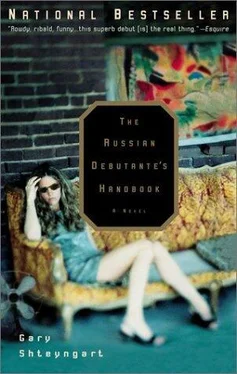Gary Shteyngart - The Russian Debutante's Handbook
Здесь есть возможность читать онлайн «Gary Shteyngart - The Russian Debutante's Handbook» весь текст электронной книги совершенно бесплатно (целиком полную версию без сокращений). В некоторых случаях можно слушать аудио, скачать через торрент в формате fb2 и присутствует краткое содержание. Город: New York, Год выпуска: 2003, ISBN: 2003, Издательство: Riverhead Books, Жанр: Современная проза, Юмористическая проза, на английском языке. Описание произведения, (предисловие) а так же отзывы посетителей доступны на портале библиотеки ЛибКат.
- Название:The Russian Debutante's Handbook
- Автор:
- Издательство:Riverhead Books
- Жанр:
- Год:2003
- Город:New York
- ISBN:0-7865-4177-6
- Рейтинг книги:4 / 5. Голосов: 1
-
Избранное:Добавить в избранное
- Отзывы:
-
Ваша оценка:
- 80
- 1
- 2
- 3
- 4
- 5
The Russian Debutante's Handbook: краткое содержание, описание и аннотация
Предлагаем к чтению аннотацию, описание, краткое содержание или предисловие (зависит от того, что написал сам автор книги «The Russian Debutante's Handbook»). Если вы не нашли необходимую информацию о книге — напишите в комментариях, мы постараемся отыскать её.
and
. The Russian Debutante’s Handbook Bursting with wit, humor, and rare insight,
is both a highly imaginative romp and a serious exploration of what it means to be an immigrant in America.
The Russian Debutante's Handbook — читать онлайн бесплатно полную книгу (весь текст) целиком
Ниже представлен текст книги, разбитый по страницам. Система сохранения места последней прочитанной страницы, позволяет с удобством читать онлайн бесплатно книгу «The Russian Debutante's Handbook», без необходимости каждый раз заново искать на чём Вы остановились. Поставьте закладку, и сможете в любой момент перейти на страницу, на которой закончили чтение.
Интервал:
Закладка:
VLADIMIR STOOD ONthe ramp breathing European air, his shirtsleeves rolled down against the autumn wind. The Virginians were gasping at the lack of modern connecting gates between the plane and the tired-looking green terminal, which Vladimir nostalgically pegged as late-socialist architecture, the kind built after local architects had long given up on constructivism and just said: “Hey, here’s some greenish glass and something not unlike cement. Let’s make a terminal.” Above the building, in large white letters: PRAVA, REPUBLIKA STOLOVAYA. Oddly enough, in Russian “Republika Stolovaya” meant “the Cafeteria Republic.” Vladimir smiled. He was a big fan of the meaty Slavic languages: Polish, Slovak, and now this.
Then the passport check, where his first Stolovan native appeared, light-haired and beefy, with a beautiful golden mustache. “No,” he said to Vladimir, pointing first to the passport photo of the college-era Vladimir with his goatee in full bloom and his dark, wispy hair extended to his behind, and then to the newly shaved, short-haired Vladimir before him. “No.”
“Yes,” Vladimir said. He tried to assume the same tired smile as in the passport, then pulled on his emerging chin hairs to indicate the forest to come.
“No,” the passport agent said meekly, but stamped Vladimir’s passport anyway. Clearly, socialism had fallen.
He picked up his valise at the luggage carousel and was ushered along with the Americans into the arrival lounge where a gleaming American Express cash machine lay in wait for them. The visiting moms and dads were picking their offspring out of a line-up of slick, young urban types, dressed as if they had just burgled New York’s famed Screaming Mimi’s boutique. Vladimir made his way through the maternal hugs and paternal shoulder-slapping to the doors, which, through a cryptic red arrow, promised escape. But he also took note of the situation: young Americans being visited by their moneyed elders. Moneyed? At least middle-class, these fiftysomethings in rumpled cords and goofy oversized sweaters. And nowadays the upper class looked down to the middle for tips on casual dressing, so anything was possible.
And then, as instantaneously as a plane falling out of the sky, the scene was russified.
Small-arms fire exploded outside.
A dozen car alarms engaged.
A detachment of men, each with a small Kalashnikov at hip level, swiftly parted the Americans into two screaming herds.
The requisite red carpet was rolled out between them.
A convoy of BMWs and armor-plated Range Rovers was assembled in protective formation.
A crepe banner bearing the curious legend PRAVAINVEST #1 FINANCIAL CONCERN WELCOME THE GIRSHKIN was unfurled.
And only then did our man finally catch sight of his new benefactor.
Flanked by three associates, all aglow in their nylon sports jackets and matching space-age trousers made out of alpaca or maybe silicon, the Groundhog solemnly approached. He was a burly, pocked little man with his eyes slightly crossed and his hair parted to make the least of a disappearing hairline.
The Groundhog placed one paw on Vladimir’s shoulder, holding him in place (as if he would dare move), then stuck out his other hand and, in his best Ukrainian accent, said rhetorically: “You are Girshkin.”
Yes, Girshkin he was.
“So, then,” the Groundhog said, “I am Tolya Rybakov, the president of PravaInvest, also called…” He looked around to his two immediate associates—one Groundhog-sized, the other closer to Vladimir’s physique—both too busy staring closely at Vladimir to pay their boss any mind. “As my father might have told you, I am also called… the Groundhog.”
Vladimir continued to shake his hand, trying to make up for his own hand’s small size with vigor and motion, while muttering, “Yes, yes, I have heard. Very pleased to meet you, Mister Groundhog.”
“Just Groundhog,” the Groundhog said tersely. “We don’t use titles in this company. Everyone knows who they are. This—” he pointed to the enormous man with small Tatar eyes and a bald dome encircled by rings of wrinkles like the cross-section of a sequoia, “This is our chief operations officer, Misha Gusev.”
“Are you called the Goose?” Vladimir asked, seizing on the name’s Russian meaning and the Groundhog’s penchant for animal names.
“No,” Gusev said. “Are you called the Jew?”
The Groundhog laughed and waved an accusatory finger at Gusev, while the third man—small but solid, with blond hair as fine as a baby’s, his eyes cobalt blue the way Lake Baikal’s waters had been some centuries ago—shook his head and said, “Forgive Gusev, he is a serious anti-Semite.”
“Yes, right,” Vladimir said. “We all have our…”
“Konstantin Bakutin,” the third man said, offering his hand. “Call me Kostya. I am the Chief Financial Officer. Congratulations on your exploits with the Immigration and Naturalization Service. That’s a tough nut to crack, and it’s not like we haven’t tried.”
Vladimir began to thank his conational in his most weighty, elaborate Russian, but the Groundhog pulled them outside, where between clusters of tour buses and forlorn Polish-made taxis stood a caravan of BMWs, each sporting a yellow “PravaInvest” logo across the bow, each surrounded by tall men in purple jackets of an unusual cut, loosely bridging the gap between business suit and smoking jacket. “These are mostly Stolovans,” explained the Groundhog. “We hire a lot of local labor.” He waved to his people as Gusev stuck two thumbs into his mouth and whistled.
In an impressive piece of postmodern choreography, twelve car doors were opened simultaneously by twelve lanky Stolovans. An associate relieved Vladimir of his luggage. Inside, the sober German interiors were violated beyond comprehension with Jersey-style zebra-striped seats and woolly cupholders.
“Very pleasant decor,” Vladimir said. “Very, as they say in American computer circles, user-friendly.”
“Oh, Esterhazy does these for us,” the Groundhog said, whistling to a hairy little man sulking about in the shadows of a Range Rover. Esterhazy, bare-chested in his black leather jacket, his leather pants capped off by suede Capezios, waved a pack of Camel cigarettes at Vladimir and gave the Hog a thumbs-up. “Yes, the Hungarians have always been ahead of the times,” said the Groundhog, almost sighing with jealousy.
With this international discussion at an end, the procession took off for the highway, Vladimir watching out for the first telltale signs—the flora and fauna, the brick and mortar—of his new country. Within minutes, the brick and mortar appeared on both sides of the road, like a signpost signaling VLADIMIR’S CHILDHOOD, NEXT HUNDRED EXITS: an endless stretch of rickety plaster Soviet-era apartment houses, each edifice peeling and waterlogged so that the inadvertent shapes of animals and constellations could be recognized by an imaginative child. And in the spaces between these behemoths were the tiny grazing spaces where Vladimir sometimes played, spaces adorned with a fistful of sand and some rusty swings. True, this was Prava and not Leningrad, but then these houses formed one long demented line from Tajikistan to Berlin. There was no stopping them.
“First lesson in the Stolovan language,” Kostya said. “These housing complexes the Stolovans call panelak s. It is evident why, no?” When nobody answered, Kostya said, “Because they look like they’re made out of panels.”
“But we don’t bother learning Stolovan,” the Groundhog said. “The bastards can all speak Russian.”
“If they give you any problems,” Gusev said, “give me a ring, and we’ll run them over like we did in ’69. I was there, you know.”
Читать дальшеИнтервал:
Закладка:
Похожие книги на «The Russian Debutante's Handbook»
Представляем Вашему вниманию похожие книги на «The Russian Debutante's Handbook» списком для выбора. Мы отобрали схожую по названию и смыслу литературу в надежде предоставить читателям больше вариантов отыскать новые, интересные, ещё непрочитанные произведения.
Обсуждение, отзывы о книге «The Russian Debutante's Handbook» и просто собственные мнения читателей. Оставьте ваши комментарии, напишите, что Вы думаете о произведении, его смысле или главных героях. Укажите что конкретно понравилось, а что нет, и почему Вы так считаете.












